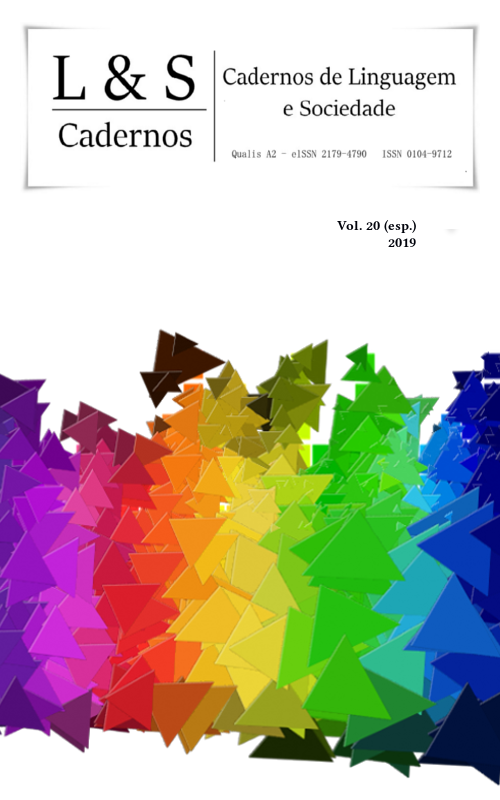VOCÊS VÃO SAIR A BEM OU A MAL: UMA ANÁLISE DE FORMAS DE TRATAMENTO (IN)DELICADAS ONLINE EM PORTUGUÊS EUROPEU
DOI:
https://doi.org/10.26512/les.v20i3.28640Palavras-chave:
Formas de tratamento, Português europeu, (In)delicadeza, Agressão verbalResumo
RESUMO
O presente artigo analisa formas de tratamento em português europeu online e o seu potencial para transmitir ou reforçar agressão verbal. Tomando como ponto de partida um vídeo filmado em janeiro de 2019 no Bairro da Jamaica, nos subúrbios de Lisboa, em que forças policiais agridem fisicamente vários residentes, constituíram-se dois corpora agregando comentários publicados na plataforma YouTube e em jornais online portugueses. As principais conclusões são: as formas de tratamento constituem estratégias linguísticas de facilitação de agressão verbal e de indelicadeza; as plataformas online constituem contextos discursivos específicos, não devendo ser estudadas de forma homogénea; noções de identidade e de cognição são aspetos fundamentais a desenvolver no âmbito de investigações futuras sobre formas de tratamento.
Palavras-chave: Formas de tratamento. Português europeu. (In)delicadeza. Agressão verbal.
Downloads
Referências
ANGOURI, J.; TSELIGA, T. “You Have No Idea What You Are Talking About!” From e-disagreement to e-impoliteness in two online fora. Journal of Politeness Research, v. 6, p. 57-82, 2010.
ARCHER, D. Slurs, insults, (backhanded) compliments and other strategic facework moves. Language Sciences, v. 52, p. 82-97, 2015.
ARCHER, D. Verbal aggression and impoliteness: Related or synonymous? In: BOUSFIELD, D.; LOCHER, M. A. (ed.). Impoliteness in Language. Studies on its Interplay with Power in Theory and Practice. Berlin: Mouton de Gruyter, 2008.
BLITVICH, P. G.-C. Introduction: The status-quo and quo vadis of impoliteness research. Intercultural Pragmatics, v. 7, n. 4, p. 535-559, 2010a.
BLITVICH, P. G.-C. The YouTubification of Politics, Impoliteness and Polarization. In: TAIWO, R. (ed.). Handbook of Research on Discourse Behavior and Digital Communication: Language Structures and Social Interaction. Hershey: Information Science Reference, 2010b.
BLITVICH, P. G.-C. A Genre Approach to the Study of Im-politeness. International Review of Pragmatics, v. 2, p. 46-94, 2010c.
BLITVICH, P. G.-C.; BOU-FRANCH, P.; LORENZO-DUS, N. Identity and impoliteness: The expert in the talent show Idol. Journal of Politeness Research, v. 9, n. 1, p. 97-121, 2013.
BOUSFIELD, D. Impoliteness in the struggle for power. In: BOUSFIELD, D.; LOCHER, M. A. (ed.). Impoliteness in Language. Studies on its Interplay with Power in Theory and Practice. Berlin: Mouton de Gruyter, 2008.
BRAUN, F. Terms of Address. Problems of Patterns and Usage in Various Languages and Cultures. Berlin: Mouton de Gruyter, 1988.
BROWN, A.; GILMAN, R. The Pronouns of Power and Solidarity. In: SEBEOK, T. A. (ed.). Style in Language. [s.l.]: MIT Press, 1960.
BROWN, P.; LEVINSON, S. C. Politeness. Some universals in language usage. Cambridge: Cambridge University Press, 1987.
CARREIRA, M. H. Modalisation linguistique en situation d’interlocution: proxémique verbale et modalités en portugais. Louvain-Paris: Peeters, 1997.
CARREIRA, M. H. Semântica e discurso, estudos de Linguística Portuguesa e Comparativa (Português/Francês). Porto: Porto Editora, 2001.
CARREIRA, M. H. Les formes allocutives du portugais européen: évolutions, valeurs et fonctionnements discursifs. In: Coloquio Pronombres de Segunda Persona y Formas de Tratamiento en las Lenguas de Europa. Plenary talk. Paris: Instituto Cervantes de Paris, 2003. Available at: https://cvc.cervantes.es/lengua/coloquio_paris/ponencias/pdf/cvc_araujo.pdf. Last accessed in: 27 July 2019.
CINTRA, L. F. L. Sobre Formas de Tratamento na Língua Portuguesa. Lisboa: Livros Horizonte, 1972.
CLYNE, M.; NORRBY, C.; WARREN, J. Language and human relations: styles of address in contemporary language. Cambridge: Cambridge University Press, 2009.
COOK, M. Uma Teoria de Interpretação das Formas de Tratamento na Língua Portuguesa. Hispania, v. 80, n. 3, p. 451-464, 1997.
COOK, M. Portuguese Pronouns and Other Forms of Address, from the Past into the Future -Structural, Semantic and Pragmatic Reflections. Ellipsis, v. 11, p. 267-290, 2013.
CUESTA, P. V.; LUZ, M. A. M. Gramática da Língua Portuguesa. Lisboa: Edições 70, 1971.
CULPEPER, J. Towards an anatomy of impoliteness. Journal of Pragmatics, v. 25, p. 349-367, 1996.
CULPEPER, J. Impoliteness and entertainment in the television quiz show: The Weakest Link. Journal of Politeness Research, v. 1, p. 35-72, 2005.
CULPEPER, J. Impoliteness. Using Language to Cause Offence. Cambridge: Cambridge University Press, 2011.
CULPEPER, J.; BOUSFIELD, D.; WICHMANN, A. Impoliteness revisited: with special reference to dynamic and prosodic aspects. Journal of Pragmatics, v. 35, p. 1545-1579, 2003.
CULPEPER, J. Impoliteness Strategies, In: CAPONE, A.; MEY, J. L. (ed.). Interdisciplinary Studies in Pragmatics, Culture and Society. Cham: Springer, 2016.
CULPEPER, J.; HARDAKER, C. Impoliteness. In: CULPEPER, J.; HAUGH, M.; KÁDÁR, D. Z. (ed.). The Palgrave handbook of linguistic (im)politeness. Basingstoke: Palgrave Macmillan, 2017.
CUNHA, C.; CINTRA, L. F. L. Gramática do Português Contemporâneo. Lisboa: Edições João Sá da Costa, 1998.
DICKEY, E. Forms of address and terms of reference. Journal of Linguistics, v. 33, p. 255-274, 1997.
DOBS, A.; BLITVICH, P. G. C. Impoliteness in interaction: accounting for face-threat witness’s responses. Journal of Pragmatics, v. 53, p. 112-130, 2013.
DUARTE, I. M. Formas de Tratamento em Português: entre léxico e discurso. Matraga, v. 18, n. 28, p. 84-10, 2011.
EELEN, G. A Critique of Politeness Theories. Manchester: St. Jerome Publishing, 2001.
FAIRCLOUGH, N. Language and Power. Harlow: Longman, 2001.
GILMAN, A.; BROWN, R. Who says "tu" to whom. ETC: A Review of General Semantics, v. 15, p. 169-174, 1958.
GOFFMAN, E. Interaction Ritual. Essays on Face-to-Face Behaviour. New York: Pantheon, 1967.
GOUVEIA, C. As dimensões da mudança no uso das formas de tratamento em Português Europeu. In: DUARTE, I. M.; OLIVEIRA, F. (ed.). O fascínio da linguagem. Porto: Faculdade de Letras da Universidade do Porto, 2008.
GOUVEIA, C. Tu como marca interpessoal de superioridade e de distância em Português Europeu. In: Symposium “Próximos ou distantes? Formas de tratamento nas diferentes variedades do português”, VI SIMELP-Simpósio Muncial de Estudos de Língua Portuguesa, Plenary Talk. Santarém: Escola Superior de Educação do Instituto Politécnico de Santarém, 2017. (Personal correspondence with the author).
GRAHAM, S. L. Disagreeing to agree: Conflict, (im)politeness and identity in a computer-mediated community. Journal of Pragmatics, v. 39, p. 742-759, 2007.
HAMMERMUELLER, G. 2003. Adresser ou eviter, c’est la question. Comment s’adresser quelque’un en portugais sans avoir recours à un pronom ou à une autre forme équivalente. In: Coloquio Pronombres de Segunda Persona y Formas de Tratamiento en las Lenguas de Europa. Plenary talk. Paris: Instituto Cervantes de Paris, 2003. Available at: https://cvc.cervantes.es/lengua/coloquio_paris/ponencias/pdf/cvc_hammermueller.pdf.Last accessed in: 27 July 2019.
HAVERKATE, H. Strategies in Linguistic Action. Journal of Pragmatics, v. 7, p. 637-656, 1983.
HERRING, S. Computer-Mediated Discourse Analysis: An Approach to Researching Online Behavior. In: BARAB, S. A.; KLING, R.; GRAY, J. H. (ed.). Designing for Virtual Communities in the Service of Learning. New York: Cambridge University Press, 2004.
HERRING, S. A Faceted Classification Scheme for Computer-Mediated Discourse. Language@Internet, v. 4, 2007. Available at: https://www.languageatinternet.org/articles/2007/761. Last accessed in: 27 July 2019.
JANICKI, K. What is conflict? What is aggression? Are these challenging questions? Journal of Language Aggression and Conflict, v. 5, n. 1, p. 156-166, 2017.
JARY, M. Relevance theory and the communication of politeness. Journal of Pragmatics, v. 30, p. 1-19, 1998.
KERBRAT-ORECCHIONI, C. Introducing polylogue. Journal of Pragmatics, v. 36, p. 1-24, 2004.
KIENPOINTNER, M. Impoliteness and Emotional Arguments. Journal of Politeness Research, v. 4, n. 2, p. 243-265, 2008.
KRETZENBACHER, H. L.; SCHUPBACH, D. Communities of Addressing Practice? Address in Internet Forums Based in German-Speaking Countries. In: NORRBY, C.; WIDE, C. (ed.). Address practice as social action: European perspectives. Basingstoke: Palgrave Pivot, 2015.
LARA, V.; GUILHERME, A. The politeness of você in European Portuguese. Studies in Hispanic and Lusophone Linguistics, v. 11, n. 2, p. 337-366, 2018.
LOCHER, M. Power and Politeness in Action: Disagreements in Oral Communication. Berlin and New York: Mouton de Gruyter, 2004.
LOCHER, M. Introduction: Politeness and impoliteness in computer-mediated communication. Journal of Politeness, v. 6, p. 1-5, 2010.
LOCHER, M. Electronic discourse. In: SCHNEIDER, K. P.; Barron, A. (ed.). Pragmatics of Discourse. Berlin: Mouton, 2014.
LOCHER, M.; WATTS, R. J. Politeness Theory and Relational Work. Journal of Politeness Research, v. 1, n. 1, p. 9-33, 2005.
LOCHER, M.; WATTS, R. J. Relational work and impoliteness: Negotiating norms of linguistic behaviour. In: BOUSFIELD, D.; LOCHER, M. A. (ed.). Impoliteness in Language. Studies on its Interplay with Power in Theory and Practice. Berlin: Mouton de Gruyter, 2008.
LORENZO-DUS, N.; BLITVICH, P.G.-C.; BOU-FRANCH, P. On-line polylogues and impoliteness: The case of postings sent in response to the Obama Reggaeton YouTube video. Journal of Pragmatics, v. 43, p. 2578-2593, 2011.
MILLS, S. Gender and Politeness. Cambridge: Cambridge University Press, 2003.
MULLANY, L. “Stop Hassling Me!” Impoliteness, Power and Gender Identity in the Professional Workplace. In: BOUSFIELD, D.; LOCHER, M. A. (ed.). Impoliteness in Language. Studies on its Interplay with Power in Theory and Practice. Berlin: Mouton de Gruyter, 2008.
OLIVEIRA, S. M. Winning friends and influencing people abroad: Using native speakers' communicative strategies. Intercultural Communication Studies, v. IV, n. 1, p. 23-44, 1994.
OLIVEIRA, S. M. Negotiating Identity, Conflict, and Cooperation within a Strategic Model of Address. In: DENIS, A.; KALEKIN-FISHMAN, D. (ed.). The ISA handbook in contemporary sociology: conflict, competition, cooperation. London: Sage, 2009.
OLIVEIRA, S. M. Address in computer-mediated communication. In: HERRING, S. C.; STEIN, D.; VIRTANEN, T. (ed.). Pragmatics of computer-mediated communication. Handbooks of Pragmatics, v. 9. Bonn: Walter de Gruyter, 2013.
PERELMUTTER, R. Globalization, conflict discourse, and Jewish identity in an Israeli Russian-speaking online community. Journal of Pragmatics, v. 134, p. 134-148, 2018.
SERRANO, M. J. Going beyond address forms. Variation and style in the use of the second-person pronouns tú and usted. Pragmatics, v. 27, n. 1, p. 87-114, 2017.
SPENCER-OATEY, H. (Im)Politeness, Face and Perceptions of Rapport: Unpackaging their Bases and Interrelationships. Journal of Pragmatics, v. 34, n. 5, p. 529-545, 2005.
TERKOURAFI, M. Beyond the micro-level in politeness research. Journal of Politeness Research, v. 1, n. 2, p. 237-262, 2005.
UPADHYAY, S. R. Identity and impoliteness in computer-mediated reader responses. Journal of Politeness Research, v. 6, p. 105-125, 2010.
WATTS, R. J. Politeness. Cambridge: Cambridge University Press, 2003.
WATTS, R. J. Linguistic politeness research: Quo vadis? In: WATTS, R. J.; IDE, S.; EHLICH, K. (ed.). Politeness in Language: Studies in its History, Theory and Practice. 2. ed. Berlin and New York: Mouton de Gruyter, 2005.
Downloads
Publicado
Como Citar
Edição
Seção
Licença
Autores/as que publicam nesta revista concordam com os seguintes termos:
Autores/as mantêm os direitos autorais e concedem à revista o direito de primeira publicação, sendo o trabalho simultaneamente licenciado sob a Creative Commons Attribution 4.0 International license que permite o compartilhamento do trabalho com reconhecimento da autoria do trabalho e publicação inicial nesta revista.



